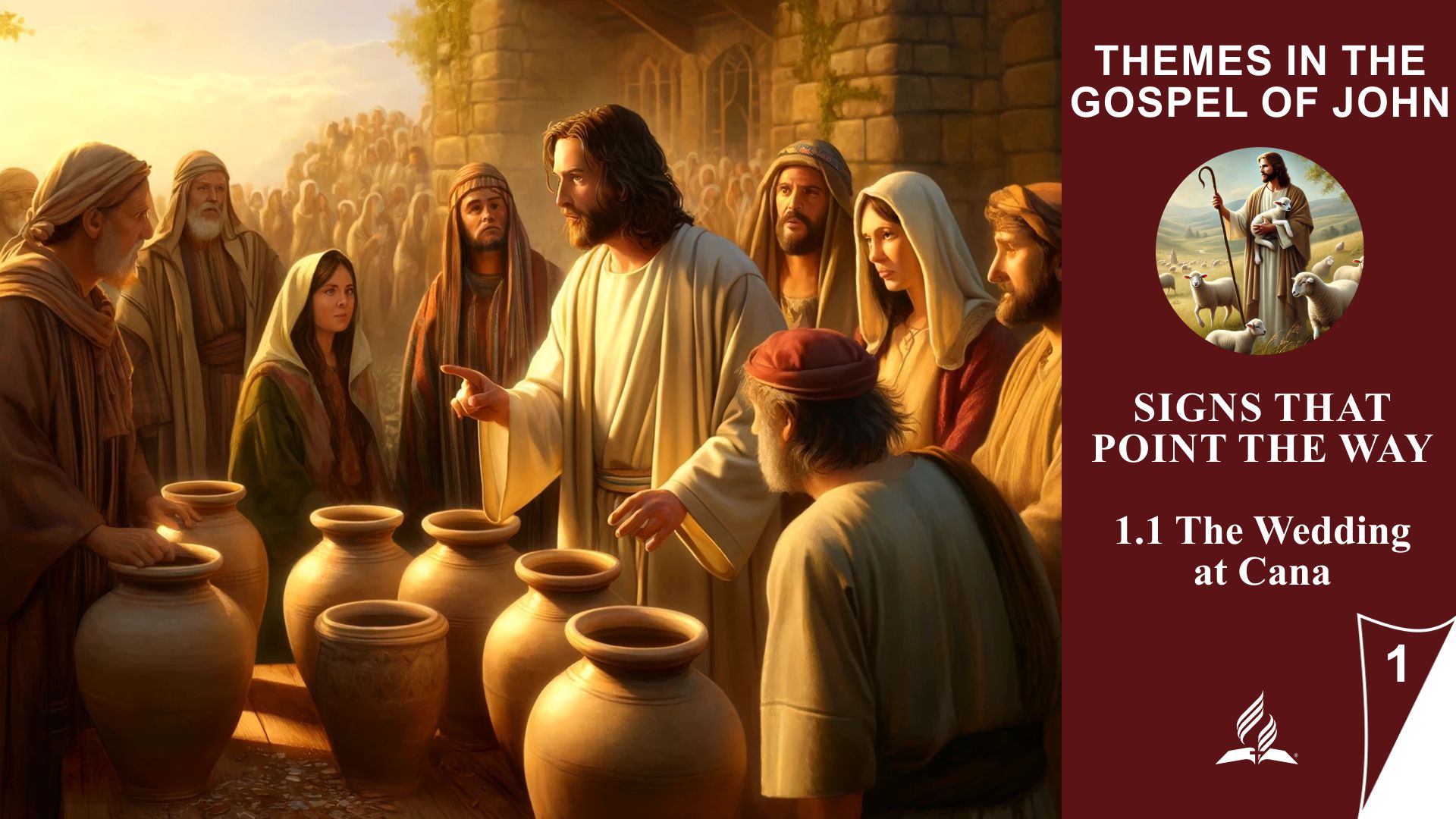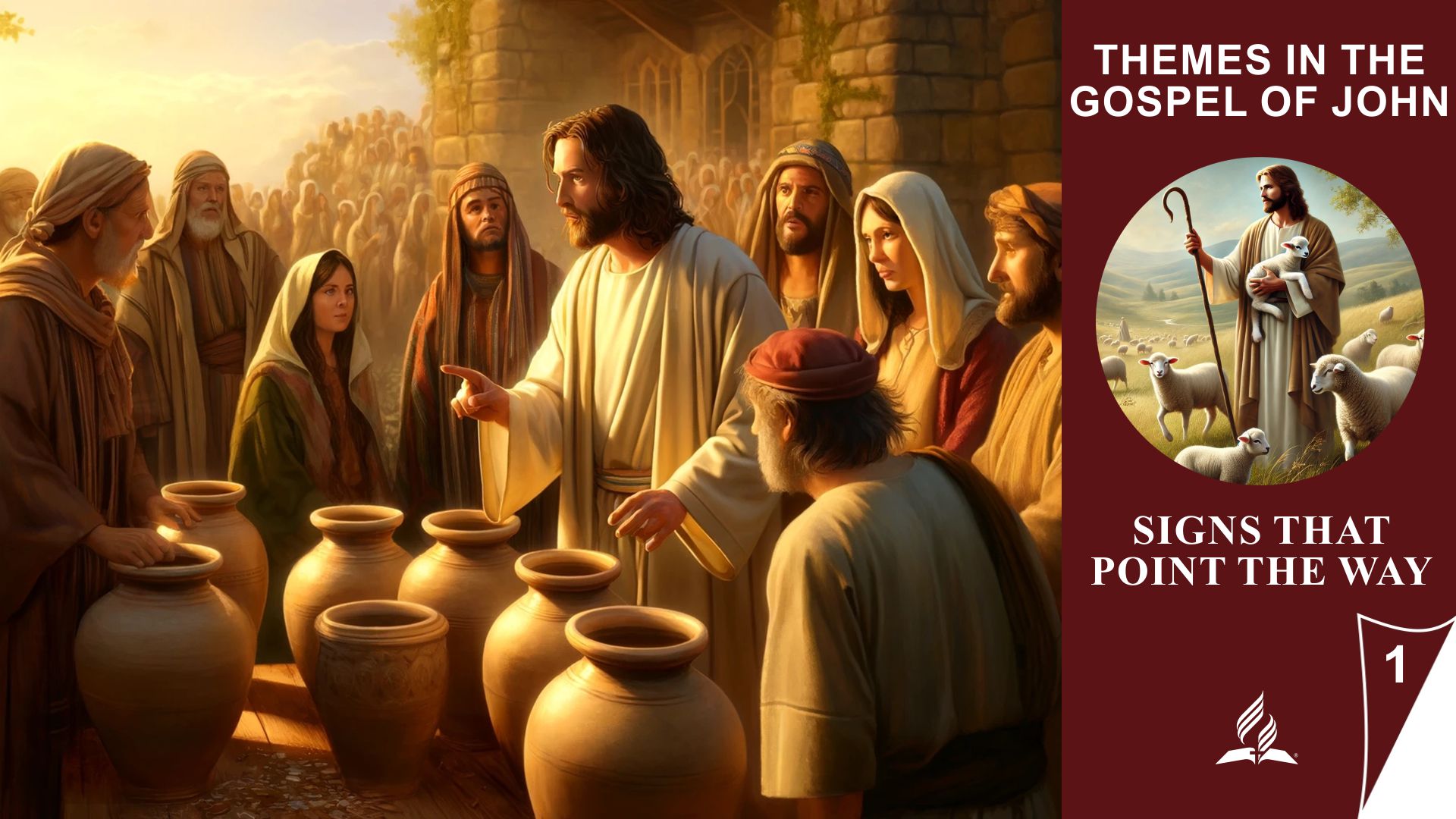


Lesson 1.Signs That Point the Way
The Revelation of Jesus through Miracles
The Gospels report many miracles that Jesus performed during His earthly ministry. However, in the Gospel of John, these miracles are not only described as demonstrations of power but also as signs that point to something much greater—the divine nature of Jesus and His mission to save humanity. These signs serve as guides, showing believers the path to deeper understanding and trust in Jesus as the Son of God.
In this first lesson, “Signs That Point the Way,” we explore some of the most important miracles described by John. From the transformation of water into wine at the wedding in Cana, to the healing of the royal official’s son, and the healing of the paralytic at the Pool of Bethesda—each of these signs reveals not only Jesus’ power over creation and life but also His close relationship with the Father and His role as the Redeemer.
These signs challenge us to look beyond mere miracles and recognize that they guide us toward a deeper faith. They encourage us to trust in God’s work in our own lives, even when things often turn out differently than we expect. The lesson invites us to examine our faith: Are we ready to accept Jesus not only as a miracle worker but as our Lord and Savior?
1.1 The Wedding at Cana
Signs That Show the Way
Read John 2:1–11. What sign did Jesus perform at Cana, and how did it help His disciples come to believe in Him?
In John 2:1–11, the first miracle of Jesus is described, where He turns water into wine at a wedding in Cana. This sign was a pivotal moment for the disciples, helping them believe in Jesus. They experienced not only an impressive miracle but also saw in this event a deeper symbol that revealed Jesus as the Savior sent by God. It was a clear indication of His divine authority, even if they might not have fully realized that He Himself was God.
A comparison to Moses, the leader of the Israelites, highlights the symbolic depth of this miracle. Moses led the people out of slavery in Egypt through “signs and wonders,” including turning the Nile into blood as one of the plagues over the Egyptians. Jesus performed a similar sign in Cana, but instead of turning water into blood, He turned it into wine—a symbol of joy and blessing. This parallel portrays Jesus as the promised prophet like Moses but also as the true Redeemer who brings a deeper, spiritual salvation.
The fact that Jesus transformed water from jars used for ceremonial cleansing into wine emphasizes the connection of this miracle to redemption. The water, symbolizing ritual purification, is transformed by Jesus’ miracle into something new, perfect, and joyful. Thus, John pointed to Jesus as the one who grants not only external but also inner cleansing and renewal.
The master of the feast was surprised by the quality of the wine, unaware of the miracle, and noted that usually the best wine is served first. However, Jesus reversed this human expectation—much like in His redemptive work, which always holds the best until the end.
It is also important to emphasize that the wine Jesus produced was not alcoholic. Ellen White explains that it was unfermented grape juice, a pure symbol of joy and blessing. This clarifies that the miracle at Cana was not intended to promote alcoholism but rather to demonstrate divine provision and a sign of God’s overflowing grace.
Overall, this first sign of Jesus at Cana symbolizes not only His power over the elements but also His role as the true Redeemer who has come to free humanity and fill it with the true “wine” of life—His grace and redemption.
What reasons do you have to follow Jesus? (There are many, aren’t there?)
Yes, there are many reasons to follow Jesus, and they touch different areas of life and faith. Here are some central reasons:
-
His Unconditional Love: Jesus shows a love that is independent of our mistakes and weaknesses. This unconditional love provides hope and comfort, even in the darkest moments of life (John 15:13).
-
His Forgiveness and Grace: Through Jesus, we are granted forgiveness. He took the world’s sin upon Himself and offers us forgiveness and redemption, no matter how often we fail (1 John 1:9). This forgiveness leads to a new life and deep inner freedom.
-
His Example of Neighborly Love: Jesus lived as an example of how to serve others and practice neighborly love. His message to love and support the needy, the sick, and the outcasts inspires us to bring compassion and justice into everyday life (Matthew 25:40).
-
Hope of Eternal Life: Jesus promises eternal life to those who believe in Him (John 3:16). This hope of eternal communion with God provides deep assurance and strengthens faith, even in the face of suffering or death.
-
His Teachings Provide Guidance: Jesus’ teachings—such as the Sermon on the Mount—are a source of profound wisdom and moral guidance. They offer practical advice for living a life of peace, justice, and truth (Matthew 5-7).
-
His Presence and Nearness: Jesus has promised to always be with us, even in life’s challenges (Matthew 28:20). This constant presence of God gives strength to continue through difficult times and ensures we are never alone.
-
His Victory Over Evil: Jesus has defeated evil and death through His resurrection. This victory gives believers the assurance that evil does not have the final word and that God is always fighting for us (1 Corinthians 15:57).
Each of these reasons shows how comprehensive and deep a relationship with Jesus shapes life. Which of these motivations stands out the most may vary individually, but they all inspire and invite us to follow Him and grow in faith.
The Story of the Wedding at Cana (John 2:1–11) clearly demonstrates how deeply Jesus’ work penetrates our daily lives and our faith. The first miracle, where Jesus turned water into wine, is not only proof of His divine power but also carries a symbolic meaning for our everyday lives.
Connection to Daily Life and Faith:
-
Jesus Provides for Our Needs: The miracle at the wedding shows that Jesus is present even in everyday situations like a celebration and intervenes where human means fail. This illustrates that Jesus is not only concerned with big spiritual questions but also with our daily worries and needs. When in life “the wine runs out”—a symbol of joy and fulfillment—we can rely on Jesus to provide in these moments.
-
Transformation and Renewal: The transformation of water into wine symbolizes how Jesus can transform not only circumstances but also our lives. Just as the water from the ritual jars for purification was turned into valuable wine, Jesus can transform our everyday lives through His presence and grace, filling them with joy and blessing. This reminds us that He is capable of renewing and changing us internally, no matter our situation.
-
A Sign of Faith: For the disciples, this miracle was a key event that helped them believe and follow Jesus. Similarly, in our daily lives, we experience moments where God acts in unexpected ways to show us that He is present. These signs—whether big or small—strengthen our faith and lead us deeper into following Jesus. They call us to trust in Him amidst daily challenges and hold firmly to His presence.
-
God’s Grace in Abundance: Jesus did not just turn a little water into wine but filled six large jars typically used for ceremonial cleansing. This symbolizes the overflowing grace of God available to us in our daily lives. God not only gives us what is necessary but often blesses us beyond our expectations—a reassuring sign for our trust in Him.
-
Quality and Blessing of Life: The master of the feast was surprised that the best wine was saved until the end. This shows that Jesus has the best prepared for us, often beyond our expectations. In everyday life, this means that Jesus can enrich life in a way that is deeper and more fulfilling than what human means alone can achieve.
Conclusion:
The miracle at Cana is more than an impressive story; it is a profound symbol of Jesus’ work in our daily lives. It reminds us that Jesus is present in the everyday moments of our lives, ready to help us, transform us, and grant us His overflowing grace. This event strengthens our faith and shows us that we can trust Him in all aspects of life—whether in moments of joy or in times of need.

Trust that God can perform miracles even in the small moments of everyday life.
(Visited 18 times, 1 visits today)






















